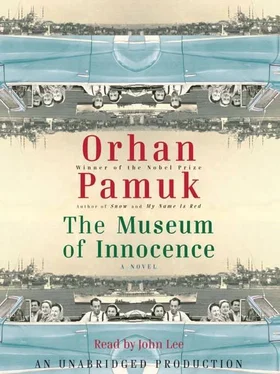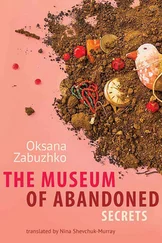After supper I went out to Baghdad Avenue, where, years ago, when I was young, I had so often “promenaded” with my friends, and as I walked down the wide sidewalks, I again tried as hard as I could to put myself in Füsun’s shoes, to figure out precisely how Füsun would interpret the situation were I to stop punishing her. In a blinding flash it came to me: A beautiful woman like her, a woman with brains who knew what she wanted, would have no trouble finding another producer to back her husband’s film. A scorching and jealous regret overtook me. The next day I sent Çetin off to find out what was playing in the open-air cinemas of Beşiktaş, which investigation led me to decide that there was “an important film not to be missed.” Sitting in my office at Satsat with the receiver pressed to my ear, listening to the phone ringing in Füsun’s house, my heart began to pound as I realized that, whoever answered, I would be unable to speak naturally.
As nothing natural could come of trying to satisfy the conflicting demands of visceral and diplomatic pique, I felt compelled at least to prolong the latter for as long as no apology was forthcoming. So it was that we passed our last summer evenings in Istanbul ’s cinema gardens, our dignity chastened, having little fun, speaking even less, feigning mutual indignation. My grimace was infectious-and of course Füsun responded in kind. I resented her obliging me to make this pretense, and now this in turn would make me genuinely indignant. Over time, the persona I assumed in her presence came to supplant my true self. It must have been then I first came to realize that for most people life was not a joy to be embraced with a full heart but a miserable charade to be endured with a false smile, a narrow path of lies, punishment, and repression.
While these Turkish films kept telling us that one could find “the truth” leaving behind this “world of lies,” by now I could no longer believe in the films we saw in the open-air cinemas, with ever dwindling audiences. I could no longer submit to that sentimental realm. By the end of summer, the Star Cinema in Beşiktaş was so empty that it would have looked strange for me to sit too close to Füsun, so I left a seat empty between us, and as the winds grew colder, my contrived sulking hardened into icy remorse. Four days later we went to the Club Cinema in Feriköy, but instead of a film, there were beds with penniless boys tended by headscarf-wearing aunties, and it amused us when we realized that the city council had organized a circumcision ceremony, complete with acrobats, magicians, and dancers, for families who couldn’t afford their own rite. But when the good-hearted mustached mayor saw how pleased we were and asked us to join them, Füsun and I, both so determined to present each other a cold shoulder, declined. It was infuriating to see her responding to my diplomatic pique with her own no less contained version while also keeping the pantomime subtle enough for her husband not to notice.
I managed not to call them for six days. It bothered me that neither Füsun nor her husband had ever once called me. If we were not going to make this film, what excuse could I have for calling them? If I wanted to carry on seeing them, I would have to give them some money, an unbearable truth, one I couldn’t accept.
The last film we went to was at the Majestic Garden Cinema in Pangaltı at the beginning of October. It was a warm night, and there were some others in attendance. I was hoping that on this beautiful evening, probably the last of the summer, our recriminations, the diplomatic standoff, might end. But before we took our seats, something happened: I ran into Cemile Hanım, the mother of a childhood friend. She had also been one of my mother’s bezique partners in those days, but it was as if she grew ever poorer with age. We exchanged looks, as if to say, What are you doing here? in the manner of people who come from old money and feel ashamed and guilty at the loss of their fortunes.
“I was curious to see Mükerrem Hanım’s house,” said Cemile Hanım, as if making a confession.
I did not understand what she meant. I assumed that some interesting person named Mükerrem Hanım lived in one of the old wooden houses whose interiors you could see from the cinema garden, and so I sat down next to Cemile Hanım, that we might look into this house together. Füsun and her husband went to sit six or seven rows in front of us. When the film began I realized that it was the house in the film she was referring to as Mükerrem Hanım’s. This was the princely abode in Erenköy of a prominent aristocratic family-I used to ride past it on my bicycle when I was a child. After falling on hard times, they (like so many old families of my mother’s acquaintance) had taken to renting out their villas to Yeşilçam Films as sets. Cemile Hanım was not here to cry her eyes out watching a film called More Bitter Than Love , but to see the wood-inlaid rooms of an old pasha’s house serving fictively as the home of an evil family who were evidently new money. I should have stood up and gone to sit next to Füsun. But I couldn’t, for a strange shame had immobilized me. I was like a teenager refusing to sit with his parents at the cinema, but also unwilling to acknowledge the source of his shame.
This shame, mingling with my affected pique, which I remain reluctant to acknowledge even so many years later, made it easier to sustain the pretense of being offended. When the film was over, I rejoined Füsun and her husband, whom Cemile Hanım gave a careful look up and down. Füsun was sulking even more than before, and I had no recourse but to respond in kind. On the way back, the silence in the car was hard to bear, and so I fantasized about throwing off this role in which I had cast myself with an unexpected joke, bursting into mad laughter, or getting drunk-but all in vain.
For five days I didn’t call them. I survived on elaborate and delicious fantasies of a contrite Füsun preparing to ask my forgiveness. In my dreams I answered her regretful pleas by blaming her, and when I had listed her faults one by one, I had so fully persuaded myself of her anguish that before long I was as genuinely angry as anyone who had been dealt a terrible injustice.
The days I didn’t see her became harder and harder to endure. Once again I was in thrall to the dark, dense anguish that had held me captive for a year. I was terrified of making a mistake for which my punishment would be never to see Füsun again. To keep this from happening, I had to ensure that Füsun did not see the extent of my visceral pique. So now the weapon I’d fashioned of my anger was turned inward, punishing me alone. An indignant and broken heart is of no use to anyone. By continuing to take offense, I was hurting only myself. One night, while thinking about all this, walking alone amid the falling autumn leaves of Nişantaşı, I realized that the happiest resolution-and therefore the most hopeful-would be to see Füsun three or four times a week (and never less than twice). Only then could I return to my old equilibrium without again falling into the bilious black abyss of love. Now I knew I could no longer endure not seeing Füsun-no matter whether out of wanting to protect myself or to injure her. To avoid the hell of the preceding year, I would have to keep the promise I had made in my letter to Füsun sent via Ceyda: I would have to bring her my father’s pearl earrings.
The next day, when I went out to Beyoğlu for lunch, the pearl earrings were in my pocket, nestling in the box my father had given me. It was October 12, 1976, a bright, sunny day with a hint of summer’s glare. The shop windows were brilliant with color. As I ate my lunch at Hacı Salih, I was candid with myself: I could admit that I had come here on purpose, and if it “happened to cross my mind to do so” there was no harm in nipping straight down to Çukurcuma to spend half an hour with Aunt Nesibe. It was a six-or seven-minute walk from the restaurant table where I was sitting. On my way here I’d glanced into the Palace Cinema and noticed that the next show started at 1:45. After lunch, if I chose, I could lose myself in that darkness that smelled of mold and damp, or at least enter a different world, and find peace. But by 1:40, having got up and paid my bill, I found myself walking down Çukurcuma Hill. There was food in my stomach, sun on the back of my neck, love on my mind, panic in my soul, and an ache in my heart.
Читать дальше












